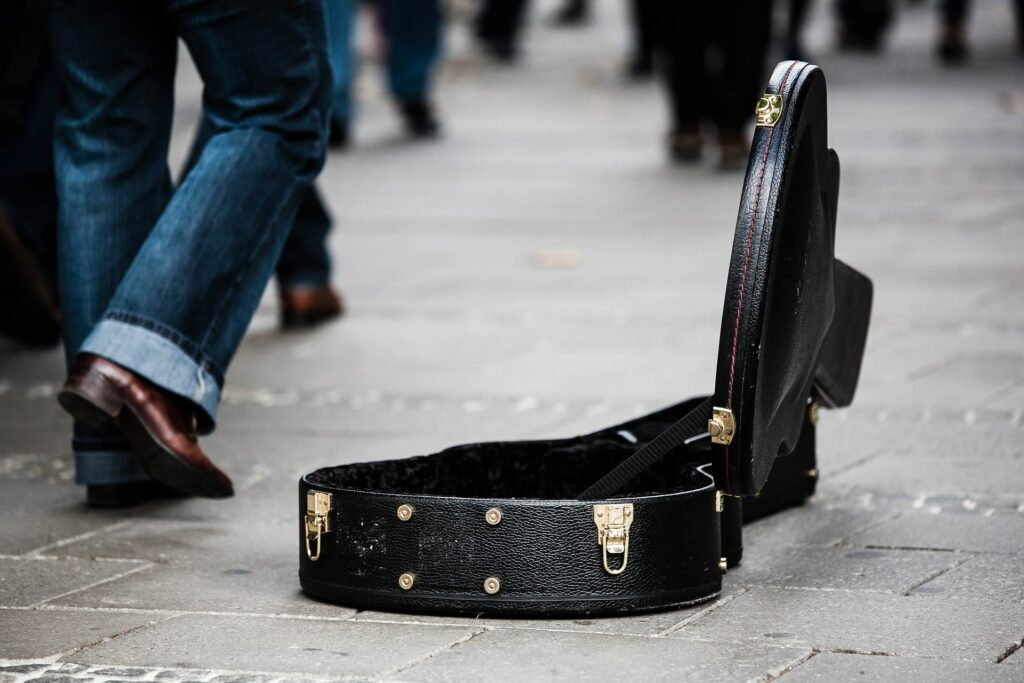
MTL Busking Handbook
Part 2: Rules and Regulations
*This article was written on July 21st, 2018 and so some information may be out of date. We will be working on an update shortly, and apologize for the inconvenience.
* Due to COVID-19, performances in the metro are temporarily suspended – source STM
Rules & Regulations (via MusiMétroMontréal)
For those looking to busk, there are 57 busking spots around Montreal’s metro stations. Some require a metro ticket to access while others can be accessed before the station’s turnstiles. In Part 1 we gave a few tips to busking around the city; this article will detail the rules and etiquette of STM busking.
Please note for the following rules and regulations: a group (3 musicians or more) have no more or less rights (and obligations) than a solo musician. That being said, some regulations apply solely to solo musicians. A duo/duet is regarded as a single entity in these cases.
1. SIGN UP
- Busking spots are indicated by a wall-mounted panel displaying a lyre, as seen above.
- The first musician to arrive at a busking spot must start a list on a sheet of paper and write down their desired time slot in order to reserve their time. They must list the date, their reserved time and the name of the performer(s). The list must leave sufficient space for other musicians to reserve spots. The list will then be placed between the wall and the lyre sign.
- All sign-up lists are valid for a single day, and the list must be created on the same day it applies to. Once the metro closes for the day, the list becomes ineffectual and is replaced by a new list created the next morning. This can be done at any point once the metro opens (around 05:00).
- You cannot reserve multiple time slots at the same spot over one day. However, you can reserve multiple spots in the same metro station so long as you honour each of your reservations.
- You may occasionally encounter multiple sign-up lists behind one lyre sign. This is usually due to multiple busking spots in one station, and other lists may concern other spots in case of a discrepancy.
- You may not reserve spaces for other musicians.
- If you encounter any problems or conflicts with others while playing, you can contact the STM security: (514) 280-4835.

2. RULES OF PLAYING
- Security regulations dictate that all equipment must stay within 2 meters of space (length-wise) and 1.6 meters from the wall. Equipment must stay behind the performer.
- Musicians must not perform directly underneath the lyre panel so other musicians may access the sign-up list(s).
- Time slots begin at 07:30. They are 3 hours long for Northern stations and 2 hours at all other stations. Northern stations are between Snowdon and Côte-Vertu, and between Laurier and Montmorency. The length of the time slots at that station must be reiterated on the sign-up sheet.
- A musician signed up for the the first time slot of the day may begin playing as early as 06:00, so long as it’s permitted at that metro station. Please clarify with an STM official that this is okay before doing so.
- If a musician is more than 30 minutes late to their reservation, their reservation is gone. Their space then becomes free to any musician who’d like to perform until the next reservation starts.
- If a musician anticipates being late by no more than one hour, they must indicate their expected time of arrival on the list next to their name. If the performer would like to leave for a 5 to 20 minute break during their reservation, they must indicate this on the sign-up sheet as well.
- Musicians may not adjust their time slots after signing up, and they cannot encroach on others’ reserved time – without exception.
- Some stations do not allow performance between 16:00 and 18:00 due to intense traffic. These stations are Sauvé and Beaudry.
- Some stations ask that you play especially quiet. These stations are Sauvé, Crémazie and Bonaventure.

3. ETHICAL CONDUCT
- MusiMétroMontréal states that performers inside STM metro stations must accept their responsibility as role models to crowds of all ages. They must use their talent, demeanor and attitude to project a positive public image, making an effort to promote pleasure, happiness and the joys of music.
- Performers must present themselves in a clean and appropriate state of dress.
- Consumption of drugs and/or alcohol is prohibited.
- Musicians may not sit directly on the floor. You may stand, bring something to sit on – a chair or a rug – but for reasons beyond our understanding, not a newspaper.
- Following this positive projection of musical expression, politeness and a sense of respect must be maintained towards other musicians, commuters and employees of the metro stations at all times.
- If a gathering crowd begins to obstruct the flow of local commuters, the musician must stop playing and ask listeners to disperse in order to allow other commuters to pass.
- Performers are not permitted to use power outlets at the STM metro stations. This will penalized by a hefty fine. Therefore, all amplification and electric instruments must be battery powered.
- The use of shrill, irritating or loud instruments may result in the musician being asked to leave or to stop using those instruments – at most metro stations. Sound levels must be kept at an appropriate volume.
- In consideration of nearby employees or vendors, musicians must perform a varied repertoire of songs that is at least half an hour in length.
- All performers must respect directives given by officers of the metro. They must respect regulations established by the STM. Buskers must follow the same set of rules as commuters, and regulations affecting musicians in particular are: Réglement CA-3 (specifically articles CA-3 13.01 and CA-3 13.02).
